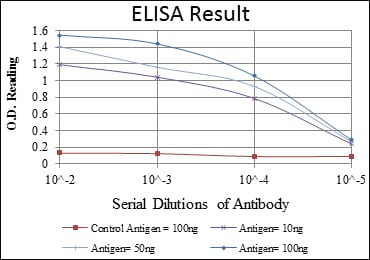
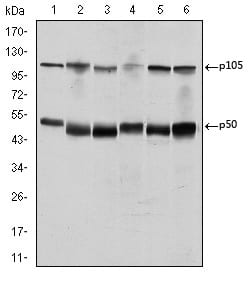
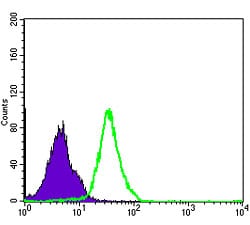
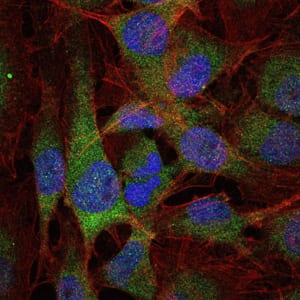
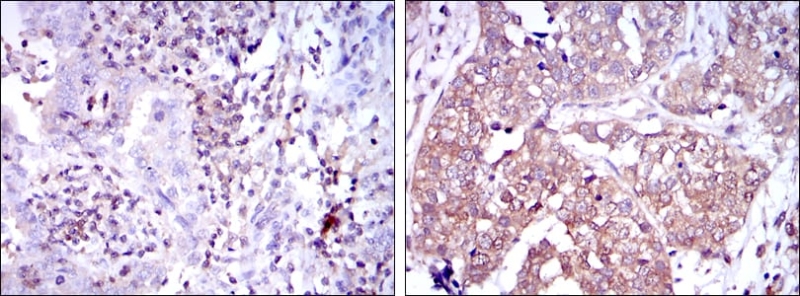
| WB | 1/500 - 1/2000 | Human,Mouse,Rat |
| IF | 咨询技术 | Human,Mouse,Rat |
| IHC | 1/200 - 1/1000 | Human,Mouse,Rat |
| ICC | 1/200 - 1/1000 | Human,Mouse,Rat |
| FCM | 1/200 - 1/400 | Human,Mouse,Rat |
| Elisa | 1/10000 | Human,Mouse,Rat |
| Aliases | p50; KBF1; p105; EBP-1; MGC54151; NFKB-p50; NFkappaB; NF-kappaB; NFKB-p105; NF-kappa-B |
| Entrez GeneID | 4790 |
| clone | 5D10D11 |
| WB Predicted band size | 50kDa/105kDa |
| Host/Isotype | Mouse IgG2a |
| Antibody Type | Primary antibody |
| Storage | Store at 4°C short term. Aliquot and store at -20°C long term. Avoid freeze/thaw cycles. |
| Species Reactivity | Human |
| Immunogen | Purified recombinant fragment of human NFKB1 expressed in E. Coli. |
| Formulation | Purified antibody in PBS with 0.05% sodium azide. |
+ +
以下是关于NFKB1抗体的3篇参考文献示例(文献信息为模拟,仅供参考):
---
1. **文献名称**:*NF-κB1/p50 regulates immune response and macrophage polarization in chronic inflammation*
**作者**:Smith A, et al.
**摘要**:研究通过Western blot和免疫组化验证NFKB1抗体的特异性,分析NFKB1在巨噬细胞极化中的作用,揭示其通过调控炎症因子影响慢性炎症进程。
2. **文献名称**:*Antibody-specific validation for NFKB1 in human cancer cell lines*
**作者**:Chen L, et al.
**摘要**:比较多种市售NFKB1抗体的灵敏度和特异性,提出基于siRNA敲低实验的抗体验证方法,强调抗体选择对癌症研究结果可靠性的重要性。
3. **文献名称**:*NFKB1 deficiency alters B cell development: Insights from knockout models*
**作者**:Park J, et al.
**摘要**:利用NFKB1基因敲除小鼠模型,通过流式细胞术和ChIP-seq验证抗体效能,阐明NFKB1缺失导致B细胞分化异常的分子机制。
---
*注:以上文献为示例,实际引用时请核实真实文献信息。建议通过PubMed或Web of Science以“NFKB1 antibody”或“NFKB1 validation”为关键词检索最新研究。*
The NFKB1 antibody is a crucial tool for studying the NF-κB (nuclear factor kappa-light-chain-enhancer of activated B cells) signaling pathway, which regulates immune responses, inflammation, cell survival, and proliferation. NFKB1 encodes the p105 protein, a precursor processed into the active p50 subunit. This subunit forms homo- or heterodimers (e.g., with RelA/p65) to bind DNA and modulate gene expression. Dysregulation of NFKB1 is linked to cancer, autoimmune disorders, and chronic inflammation.
NFKB1 antibodies detect and quantify the protein’s expression, localization, and interactions in cells or tissues. They are widely used in techniques like Western blotting, immunohistochemistry (IHC), immunofluorescence (IF), and chromatin immunoprecipitation (ChIP). Researchers employ these antibodies to investigate NF-κB activation mechanisms, such as phosphorylation, ubiquitination, or proteasomal processing of inhibitors like IκB.
Antibodies targeting specific NFKB1 epitopes (e.g., N-terminal, C-terminal, or phosphorylated residues) help dissect its functional states. Validated antibodies are essential for reliability, often confirmed via knockout controls or siRNA silencing. Commercial NFKB1 antibodies are available from multiple suppliers, with variations in host species (rabbit, mouse) and clonality (monoclonal/polyoclonal).
Understanding NFKB1’s role in disease pathways using these antibodies aids in drug development, particularly for therapies targeting NF-κB overactivation. However, cross-reactivity with related proteins (e.g., p52 from NFKB2) requires careful antibody selection and experimental validation.
×